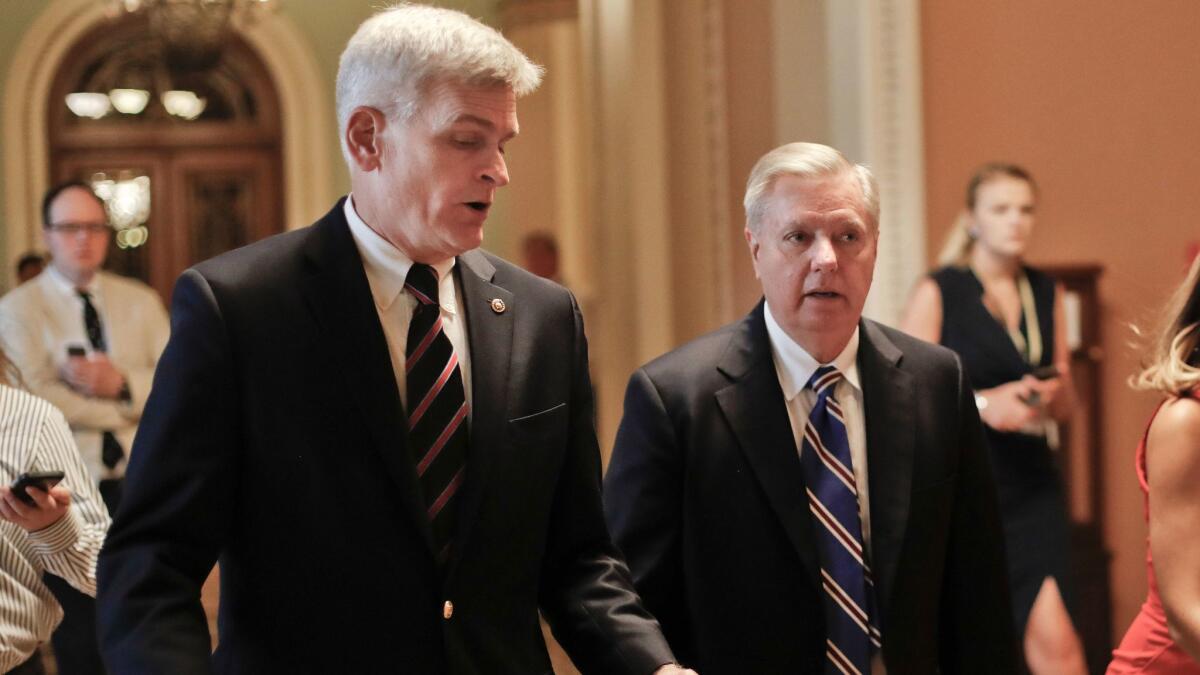Column: Sen. Cassidy’s Obamacare repeal bill gets blasted by the health secretary of his home state

- Share via
Senate Republicans are preparing to vote on their last-gasp Affordable Care Act repeal bill without estimates from the Congressional Budget Office of its effects on the deficit, health insurance coverage, or premiums. So someone else has to step in to inform the senators of the measure’s grim consequences.
Enter Rebekah Gee, the secretary of the Department of Health in Louisiana—which happens to be the home state of the measure’s chief sponsor, Sen. Bill Cassidy. In a letter to Cassidy dated Monday, Gee offers chapter and verse on how the bill would cut health coverage for 433,000 of Cassidy’s constituents enrolled in Medicaid expansion; eliminate protection for people with pre-existing medical conditions, driving many of them into the “increasingly battered and tattered safety net of public assistance”; and threaten the health of “the unborn and their mothers.”
Like all the GOP repeal proposals before it, Gee wrote, Cassidy’s bill “uniquely and disproportionately hurts Louisiana due to our recent expansion and high burden of extreme poverty.” Gee calculates that the bill’s elimination of expansion and capping of federal funding to states would cost Louisiana $3.2 billion through 2026, making Louisiana the eighth biggest loser among all states, “and by far the poorest and sickest state affected by these cuts.”
A generational bill as transformative as this one...should be done through regular order with public hearings.
— Louisiana Health Secretary Rebekah Gee
That’s a major threat to “critical access and care for our most vulnerable Medicaid populations including the disabled, children, and pregnant women,” Gee wrote.
Gee’s broadside isn’t unique—virtually every responsible healthcare expert and medical organization has said much the same, as has the fiscal analysis firm Fitch Ratings, which judged the measure “more disruptive for most states than prior Republican efforts.” As many as 32 million Americans could lose their health coverage, according to legislative analyses—far more than under previous GOP repeal bills.
But Gee’s words are notable because they’re so specific and come from Cassidy’s home state, albeit not from his side of the partisan aisle. Gee, a Utah-born physician and veteran public health administrator, was appointed secretary of the Department of Health and Human Services last year by Democratic Gov. John Bel Edwards shortly after his inauguration. Edwards promptly instituted Medicaid expansion, reversing the policy of his GOP predecessor, Bobby Jindal, of resisting the Affordable Care Act.
Whether Gee’s letter will have any effect on Cassidy is uncertain, but it’s unlikely that it will. Cassidy, like Gee a physician, hardly needs to be reminded of the effects of his bill, which is dubbed Cassidy-Graham to acknowledge the co-sponsorship of Sen. Lindsey Graham (R-S.C.). If he cared, he wouldn’t have introduced it in the first place.
Yet the Republican Senate caucus appears determined to push the bill through without even the semblance of considered discussion. The Congressional Budget Office informed the Senators on Monday that it would be able to produce only “a preliminary assessment” of the measure early next week, but would need at least several weeks more to provide specific estimates of “the effects on the deficit, health insurance coverage, or premiums.” That would place the CBO analysis past the Sept. 30 deadline for the Senate to pass the bill on a reconciliation basis, which requires only 50 votes plus a tie-breaker by Vice President Mike Pence. After that, the bill would need 60 votes to overcome a certain filibuster by Democrats.
As we reported Monday, thus far the sponsors seem to be a hair short of the 50. GOP Sens. Susan Collins of Maine and Rand Paul of Kentucky are expected to be firm “no” votes; Collins has voted against every Obamacare repeal bill so far, and Paul has said he’ll vote against this one because it doesn’t go far enough in dismantling the Affordable Care Act. Sen. Lisa Murkowski (R-Alaska) has said she’s still examining Cassidy-Graham. But she voted against the previous repeal bill, which wasn’t nearly as draconian.
Another question mark is Sen. John McCain (R-Ariz.), who also voted against the previous bill. McCain is a friend of Graham’s. Arizona’s Republican Gov. Doug Ducey has endorsed the bill, which could put pressure on McCain to go along. But McCain has been outspoken about the need to enact healthcare reform legislation only under “regular order.” That means the Senate would have to “hold hearings, receive input from members of both parties, and heed the recommendations of our nation’s governors” on healthcare, he said in July.
Cassidy-Graham is being pushed through entirely outside that process. There will be no hearings before the committees charged with healthcare legislation, virtually no debate, and no input from Democrats. For McCain to support the bill under those circumstances would mean his reneging on a principle he articulated as recently as Aug. 31.
Gee, as it happens, nodded toward that principle in her letter to Cassidy: “A generational bill as transformative as this one, that would overhaul aspects of nearly one-fifth of this country’s economy, should be done through regular order with public hearings.” Instead, it’s being rushed to a vote in “a closed-door and hurried process.”
Keep up to date with Michael Hiltzik. Follow @hiltzikm on Twitter, see his Facebook page, or email michael.hiltzik@latimes.com.
Return to Michael Hiltzik’s blog.
ALSO
With a deadline approaching, Republicans’ last push to roll back Obamacare gains strength
Turning aside risk, Democrats rally to Bernie Sanders’ single-payer health plan
Trump may strip protections from 10 national monuments
More to Read
Get the L.A. Times Politics newsletter
Deeply reported insights into legislation, politics and policy from Sacramento, Washington and beyond. In your inbox twice per week.
You may occasionally receive promotional content from the Los Angeles Times.











